 When people ask me about my trip to China, I often answer with one word: Intense!
When people ask me about my trip to China, I often answer with one word: Intense!Since a few of my colleagues have been to China, I was prepared for the conditions I would find. I was prepared for the different food, the squat toilets, not knowing the language, not having the conveniences of home. No matter how many questions I asked, or what people told me, nothing prepared me for how difficult it really was. I was shocked by the conditions, and yet surprised at how quickly I got used to it. After a few days, our favorite phrase became, “It is what it is,” meaning: just go with the flow.
 While we did travel to some tourist spots such as the Great Wall, Tiananmen Square, the Terra-Cotta Warriors, and others, our most significant parts of the trip were off the beaten path, on the road less traveled. Had we just seen the tourist spots, we could have said we’d been to China, but it would be like someone from another country going to Disneyworld and saying they had been to the U.S.
While we did travel to some tourist spots such as the Great Wall, Tiananmen Square, the Terra-Cotta Warriors, and others, our most significant parts of the trip were off the beaten path, on the road less traveled. Had we just seen the tourist spots, we could have said we’d been to China, but it would be like someone from another country going to Disneyworld and saying they had been to the U.S.As I reflect on my China adventure, the profound moments weren’t the lack of personal space,
 bartering for souvenirs, eating unidentifiable foods, a dust storm in Beijing, having my camera stolen in a market and how I got it back or even the view from atop the Great Wall (while that was spectacular!). What was profound for me was the feeling of being an obvious foreigner and being stared at everywhere we went. Our group was an intriguing mix of 20 women that included ages from 17-70, a disabled woman who walked with crutches, two African-American women, an Asian-American woman, and our guide, an American woman who now lives in China and speaks fluent Chinese, along with her daughter, half-Chinese. And, my mom! Personally, I started to feel like I was the largest person anyone in China had ever seen, and twice I was poked in the belly - to which I said, “Rub the belly for luck!”
bartering for souvenirs, eating unidentifiable foods, a dust storm in Beijing, having my camera stolen in a market and how I got it back or even the view from atop the Great Wall (while that was spectacular!). What was profound for me was the feeling of being an obvious foreigner and being stared at everywhere we went. Our group was an intriguing mix of 20 women that included ages from 17-70, a disabled woman who walked with crutches, two African-American women, an Asian-American woman, and our guide, an American woman who now lives in China and speaks fluent Chinese, along with her daughter, half-Chinese. And, my mom! Personally, I started to feel like I was the largest person anyone in China had ever seen, and twice I was poked in the belly - to which I said, “Rub the belly for luck!”Halfway through the trip, on our 20-hour train ride to southern China, I became particularly overwhelmed with the amount of extreme poverty in China. Poverty is everywhere in China, not just in certain areas of the cities or regions. It is in the tourist spots where we were harassed by people trying to sell us postcards and knick-knacks. It is in the markets where I witnessed people sitting on the ground picking through trash. It is in the cities, where every corner is
 inhabited, and every overhang is a home. It is in the garbage dumps, where I saw people living as we drove by. It is in the farms, where the farmers work during every hour of daylight, returning at night to their unheated one room shack. It was in every mile of that 20-hour train ride as I looked out the window and felt completely overwhelmed.
inhabited, and every overhang is a home. It is in the garbage dumps, where I saw people living as we drove by. It is in the farms, where the farmers work during every hour of daylight, returning at night to their unheated one room shack. It was in every mile of that 20-hour train ride as I looked out the window and felt completely overwhelmed.This kind of poverty can cause desperation. In the early 1990s in the Henan Province, provincial leaders discovered that they could make money by selling blood to pharmaceutical companies and hospitals. Blood collection centers were set up, and the move was seen as a way to help the finances of both the poor farmers in the Henan Province and the government, and to provide clean blood from a relatively isolated area of China. Henan Province has a population of 90 million people, 80% of whom are farmers. Farmers were paid $5 US for donation of blood or plasma, and many became regular donors.
 Unfortunately, proper precautions were not taken as many scrambled to set up illegal blood collection stations. Sometimes, the blood collection station was nothing more than a centrifuge, plastic tubes that were reused many times, and needles carried on a tractor, offering door-to-door collection services. The same needles were used on many donors. As people began to get sick, they didn’t know what was wrong with them. By 1996, independent research found that between 67% and 84% of people tested in different villages were HIV positive. By 2000, the latency period of the disease was coming to an end, and farmers began dying.
Unfortunately, proper precautions were not taken as many scrambled to set up illegal blood collection stations. Sometimes, the blood collection station was nothing more than a centrifuge, plastic tubes that were reused many times, and needles carried on a tractor, offering door-to-door collection services. The same needles were used on many donors. As people began to get sick, they didn’t know what was wrong with them. By 1996, independent research found that between 67% and 84% of people tested in different villages were HIV positive. By 2000, the latency period of the disease was coming to an end, and farmers began dying.Between 500,000 and 700,000 people in the Henan Province are estimated to have contracted HIV/AIDS through the sale of their blood. In the village where we visited, the population consists of approximately 3800 adults, mostly wheat farmers. 1500 sold their blood – about 40% of the population of the village. Of the people who sold their blood, over 60% contracted HIV. 30% of them have already died.
On World AIDS Day 2003, when Global Ministries East Asia and Pacific executive (and my colleague) Xiaoling Zhu learned of this situation, he made arrangements to travel to the region with our colleagues from Child Sponsorship and HIV/AIDS ministries.

There, they learned that there were many orphans of AIDS. These children were forced to stop going to school so they could either work or stay home to help their families. The children had watched their parents die horrible deaths as a result of untreated AIDS. Many families lost one parent to AIDS, while the remaining parent was also infected and unable to work.
Within months, a video was created called “Courage to Hope” and programs began in a few of the small villages in the Henan Province that were affected by HIV/AIDS. Global Ministries began a Child Sponsorship program in the area, which provided assistance to families with children, based on HIV/AIDS status and annual income. Their basic needs, such as health care, food, and school opportunities were funded through child sponsor donations of about $1 a day.
Partnerships were established with government agencies and medical schools and hospitals. Global Ministries offers financial and program support to bring help, medicine, and hope to the people in the region.
Since the Global Ministries programs began in 2004, two schools have been built, homes have been erected for families suffering HIV/AIDS without an income, medication is being provided, children are able to attend school, and a
 small loan program for farmers has been established.
small loan program for farmers has been established.
Our journey to the Chengliu village took us down a long road – a road less traveled. We walked for about 1 mile, through the narrow village paths and wheat fields, until we arrived at the Chengliu school. As we entered the large field, we were greeted by applause from about 500 villagers. Most of our group burst into tears. We were here to witness the struggles of these amazing people – and they were clapping for us? It was one of the most humbling experiences of my life.
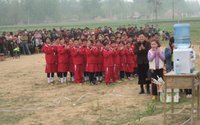

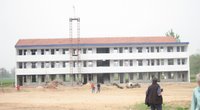
We were seated on one side of the field, where the children’s’ crude wooden desks were lined up, with their narrow benches for us to sit. From our seats, we could see the old brick school to our left, and the new modern school straight ahead, almost complete. The old school had no windows, no doors, and walls that were falling apart.
The school children were dressed in their brand new red uniforms and they gave us a beautiful performance of singing, dancing, sword maneuvers, and readings. We laughed and cried and smiled out at the beautiful faces of the children and families of this village.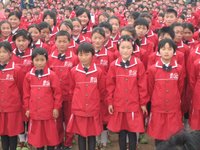
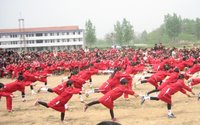
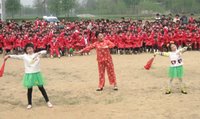
One young girl read to us a very moving letter of thanks. Her letter speaks as a thank you to both her child sponsors and to everyone involved in the projects of this village. Xiaoling tearfully translated the letter to us as she read.
Click HERE to read the letter. After the performances, we walked around the school grounds. We saw the conditions that the children attended school in, even in the winter. The children gathered around us and giggled as
After the performances, we walked around the school grounds. We saw the conditions that the children attended school in, even in the winter. The children gathered around us and giggled as  we took their photos and showed them on our digital cameras. We presented the headmasters with books and school supplies. We saw the new school, which awaits more funds to be completed. We learned that of the 400 children that attend Chengliu Elementary School, 1/3 come from HIV/AIDS affected families. 86 of the children are part of the Global Ministries Child Sponsorship program – however, only 10 of the 86 have sponsors.
we took their photos and showed them on our digital cameras. We presented the headmasters with books and school supplies. We saw the new school, which awaits more funds to be completed. We learned that of the 400 children that attend Chengliu Elementary School, 1/3 come from HIV/AIDS affected families. 86 of the children are part of the Global Ministries Child Sponsorship program – however, only 10 of the 86 have sponsors. Of all the places we visited in China, this rural village was the place where I saw the most smiles, the most friendliness, the most openness, the most joy. And yet, it was the place where people had few reasons to be joyful. I wept nearly the entire day, not out of sadness, but because, as I’ve struggled with hope in my life, I found hope in the villagers’ smiles and the children’s faces. The women placed their babies in our arms and we all giggled together. We laughed at how the children behaved just like all elementary school children behaved.
Of all the places we visited in China, this rural village was the place where I saw the most smiles, the most friendliness, the most openness, the most joy. And yet, it was the place where people had few reasons to be joyful. I wept nearly the entire day, not out of sadness, but because, as I’ve struggled with hope in my life, I found hope in the villagers’ smiles and the children’s faces. The women placed their babies in our arms and we all giggled together. We laughed at how the children behaved just like all elementary school children behaved.

The people of rural China are desperately poor, and struggling with the horrible affects of HIV/AIDS. They have few reasons to hope – and yet they are filled with hope. I said to myself, “If these people can hope, how can I not have hope?”

2 comments:
I am so glad to see that you are back in the "blog" world! It was interesting to read about your trip and I am anxious to here more when Depressionista and I visit! It is amazing to me when people who you think have the worst lives ever are the most optimistic. Gives us all hope...I am glad that you found your trip not only interesting but inspirational.
Hi Marcy,
As you already know, this moved me to tears, and it's even better with the photos. Sometimes I just can't believe you actually went there! I am amazed by the dinginess and smallness of the street scene (fourth photo down) and the awesome presence of the man in the next photo. I gotta run, talk to you later!
Post a Comment